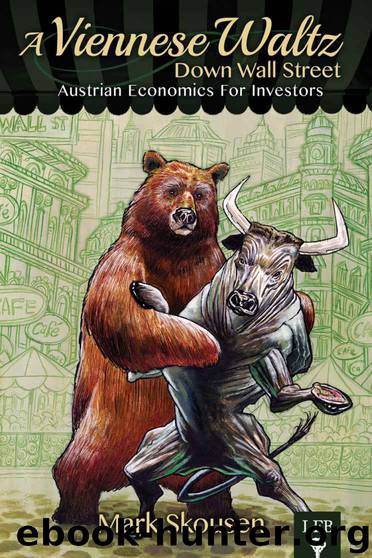A Viennese Waltz Down Wall Street: Austrian Economics for Investors (LFB) by Skousen Mark

Author:Skousen, Mark [Skousen, Mark]
Language: eng
Format: epub
Publisher: Laissez Faire Books
Published: 2013-07-23T00:00:00+00:00
The Economist As Investment Advisor
“Economics cannot teach you how to get rich.” —Roy J. Ruffin and Paul R. Gregory, Principles of Economics (1988)
Economists frequently underestimate the power their theories can have in everyday use. Ruffin and Gregory warn students that economics does not supply magic formulas that tell them Mow to choose a winning stock, or which way interest rates or the dollar are headed; economics is unable to predict the IBM of tomorrow.
The top ten textbooks are remarkably silent regarding the investment markets, despite the critical role investments play in the economy. (Only one text, Baumol and Blinder’s, has a chapter devoted to stocks and bonds.) Many academicians do not believe that the financial markets are very important; they may actually be disruptive. Economists draw a sharp distinction between the money economy, represented by the financial markets, and the real economy, the actual production of goods and services.
What’s important, they believe, are capital goods, not capital. Stock market fluctuations have very little to do with the real economy, they reason. Thus, Hyman Minsky has rightly criticized the neoclassical model as “the economics of capitalism without capitalists, capital assets, and financial markets.”1 The purpose of this chapter is to dispel this orthodox notion and to demonstrate why the investment markets are far more important than economists realize.
It is unfortunate that textbooks do not spend more time on the investment markets. The world of high finance provides an excellent laboratory in which to test economic theories. Prices of stocks, bonds, gold, and currencies vary every day in response to changing supply and demand; new information; economic crises; and the attitudes of millions of businesspeople, investors, and speculators. The opportunity is always present to make considerable profits and suffer losses. Economic analysis is also very useful in choosing which investment theories make sense and which don’t—fundamental, technical, cyclical, contrarian, etc.
When I became the editor of a financial publication in the early 1970s, I felt woefully inadequate in my knowledge of the financial world. Economics is a cousin to finance, but I found that the academic world makes it a distant cousin. Even though I had majored in economics in college and received a master’s degree and a doctorate in economics and banking, I knew very little about price-earnings ratios, margin buying, selling short, futures, and options. My academic teachers never spent much time explaining the basics of high finance, probably because they did not know much about high finance themselves. I had to learn everything on my own. I took intensive courses and workshops, read books and magazines, studied manuals, and passed commodity and stock market examinations.
Economists and Financial Advice
The Armchair Economist
There are two problems with economists when it comes to financial advice. First, economists are all too often uninterested in applying economics to specific investment decisions, and therefore they downplay the value of such application. They are seekers of knowledge, not mundane materialists. Ludwig von Mises once told his fiancée, “If you want a rich man, don’t marry me. I am not interested in earning money.
Download
This site does not store any files on its server. We only index and link to content provided by other sites. Please contact the content providers to delete copyright contents if any and email us, we'll remove relevant links or contents immediately.
International Integration of the Brazilian Economy by Elias C. Grivoyannis(111057)
The Radium Girls by Kate Moore(12028)
Turbulence by E. J. Noyes(8047)
Nudge - Improving Decisions about Health, Wealth, and Happiness by Thaler Sunstein(7706)
The Black Swan by Nassim Nicholas Taleb(7129)
Rich Dad Poor Dad by Robert T. Kiyosaki(6632)
Pioneering Portfolio Management by David F. Swensen(6300)
Man-made Catastrophes and Risk Information Concealment by Dmitry Chernov & Didier Sornette(6019)
Zero to One by Peter Thiel(5801)
Secrecy World by Jake Bernstein(4753)
Millionaire: The Philanderer, Gambler, and Duelist Who Invented Modern Finance by Janet Gleeson(4478)
The Age of Surveillance Capitalism by Shoshana Zuboff(4292)
Skin in the Game by Nassim Nicholas Taleb(4248)
The Money Culture by Michael Lewis(4207)
Bullshit Jobs by David Graeber(4190)
Skin in the Game: Hidden Asymmetries in Daily Life by Nassim Nicholas Taleb(4006)
The Dhandho Investor by Mohnish Pabrai(3764)
The Wisdom of Finance by Mihir Desai(3746)
Blockchain Basics by Daniel Drescher(3582)
